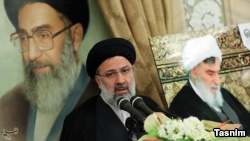Special to WorldTribune.com
Radio Free Europe / Radio Liberty
After weeks of speculation, Ebrahim Raisi, the head of Iran’s wealthiest state charity, has officially announced his intention to run in the country’s presidential vote next month.
His candidacy could galvanize conservatives and pose a serious challenge to President Hassan Rohani, who campaigned in 2013 on reform pledges and has helped relative moderates make gains after years in the political wilderness.

A religious judge who helped condemn liberals and political opponents to death in mass executions in the late 1980s, Raisi is thought to be regarded highly by Iran’s highest political, military, and religious authority, Supreme Leader Ayatollah Ali Khamenei.
“Based on his tough stances, we can say he’s a hard-line figure in line with the centers of power, ranging from the highest authority to the intelligence branch of the Islamic Revolutionary Guards Corps (IRGC),” Paris-based political analyst Morteza Kazemian told RFE/RL.
Rohani’s administration has faced intense scrutiny from conservatives opposed to the conclusion on his watch of a major deal with world powers to trade curbs on Iran’s nuclear program for sanctions relief, and his calls for greater rights for women and the release of prisoners that hard-liners regard as “seditionists.”
“Raisi is among the symbols of authoritarianism in Iran. He is against political and cultural reforms and development,” Kazemian said, adding, “Regarding the economy, he’s been bringing up populist themes like ending poverty and unemployment.”
Rohani has announced a news conference for April 10 at which he is expected to officially launch his reelection bid ahead of the presidential vote on May 19.
Tehran-based political analyst Sadegh Zibakalam told the daily Etemad recently that “if Raisi announces his candidacy, Rohani will have to take him very seriously and double his campaign efforts.”
Raisi has gained prominence recently amid speculation that he was being considered by Iran’s Assembly of Experts as a possible successor to the aging Khamenei.
Such an inside track on the supreme leader’s position could be boosted by a victory in a direct election — or threatened in the event of defeat.
That could raise the stakes in a tightly orchestrated election process just eight years after a presidential vote marred by irregularities sparked the biggest street protests Iran has seen since iconic student demonstrations in 1999.
Raisi’s name appeared alongside four others, including the head of the Imam Khomeini Relief Foundation, Parviz Fattah, on a short list of candidates issued on April 6 by a newly established coalition of conservatives aiming to unify the right and present a single candidate to challenge Rohani. Fattah has also been described by observers as a serious potential rival to Rohani.
There appears to have been a coordinated effort in Farsi media recently to suggest that the Iranian public wanted Raisi to run.
Pictures popped up on social media of young people — some of them women wearing head scarves far more loosely than Iran’s conservative arbiters of morality would like — holding pictures of the 56-year-old Mashhad native with the hashtag #RaisiCome in Persian.
